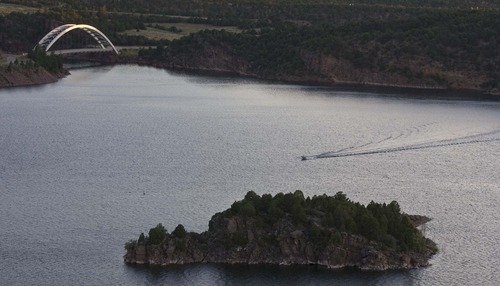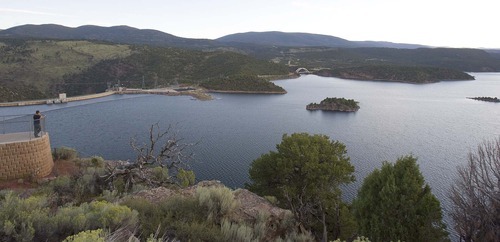This is an archived article that was published on sltrib.com in 2012, and information in the article may be outdated. It is provided only for personal research purposes and may not be reprinted.
Gov. Gary Herbert says his administration is warily analyzing a Colorado developer's plan to pipe Green River water from Flaming Gorge Reservoir to Denver.
The Utah governor isn't ready to join Wyoming Gov. Matt Mead in formally opposing the proposal.
Herbert said he is "concerned" that Utah water rights could suffer under Fort Collins businessman Aaron Million's plan to pump up to 200,000 acre-feet a year across the Continental Divide to Denver and the Front Range.
Utah water officials are studying whether the Green has enough surplus "wet water" — actual supply, as opposed to legal allocations on paper — before Herbert steps in.
"If there's not water there, we'll do everything we can to block it," Herbert said. "Water is the lifeblood here in the West, especially for arid states like Utah. We'll not relinquish one drop — one molecule — of Utah water."
Trouble is, if there's not surplus water to allow Million's Wyco Power and Water project, currently under review by federal officials, then there may not be water for Utah priorities such as the Lake Powell pipeline to St. George. It's a point that Million said should give the governor pause in criticizing Colorado's take.
Utah's plan to augment desert population growth with the Powell pipeline would take less than half as much water as Million's, though it likewise relies on the Upper Colorado River Basin containing enough water for a diversion while still meeting legal commitments to supply senior water rights downstream in California.
"If ours were to collapse on the weight of no surplus in the river," Million said, "then there's a collective collapse for other projects." If Colorado, which by compact is entitled to more water than Utah, cannot find enough for its needs, then "there's sure as hell not enough water for Utah's."
Million insists there is enough water, though, as previous Bureau of Reclamation analyses of Flaming Gorge's capacity have indicated. Those studies are being updated for the federal proposal review, though, taking into account downstream river needs such as flows for endangered fish in eastern Utah.
The proposal is under review by the Federal Energy Regulatory Commission. Million started seeking permission from the Army Corps of Engineers but switched to FERC when, he said, he recognized that hydropower generation could be a significant part of the plan. Environmentalists have accused him of seeking a simpler path to approval, though he pointed out that Utah also is using the FERC route to approve the Powell pipeline.
Wyoming's governor wrote FERC last month expressing his opposition on grounds of resource degradation and potential cost to water users, including some in Wyoming whom Million proposes to serve.
"This project would cut a vast swath across southern Wyoming, with the potential for huge impacts in many significant sectors of our economy and aspects of critical resources to Wyoming and Colorado," Mead wrote to FERC in comments posted on his state website. "The proponent has stated this project will cost $3 billion to construct but little is known about the future cost to consumers or others from such a massive project."
Million doubts there would be resource damage because he's proposing a route along a federal corridor that already contains multiple energy pipelines.
A coalition of Colorado businesses calling itself "Protect the Flows" this week said it would lobby Colorado Gov. John Hickenlooper for help blocking the pipeline and the state water rights required to fill it. They warned the plan could reduce the Green's flows by a quarter, crippling a $10 billion regional economy based on recreation.
Several West Slope Colorado communities have joined Rock Springs and Green River, Wyo., in passing resolutions against the pipeline.
Numerous environmental organizations have intervened in the FERC process seeking to insert themselves in negotiations and block the withdrawal. One coalition of 10 groups — including the Sierra Club, Wyoming Outdoor Council and Utah Rivers Council — filed such a request, saying the project threatens endangered fish and Utah's water rights.
"It's disappointing that the governor [Herbert] won't advocate more strongly for the communities and the economies that rely on the Green River," said Zach Frankel, executive director of the Utah Rivers Council. "The governor of Wyoming has intervened. That's pretty good company to be in. It's not some fringe idea."
Herbert said the state will complete its studies soon and will still have time to intervene if necessary.
Twitter: @brandonloomis —
Pipeline plan
Wyco Power and Water would take up to 200,000 acre-feet a year.
A 500-mile pipeline would deliver water from Flaming Gorge to Denver and south to Pueblo.
The project also could supply water to eastern Wyoming, though that state has opposed the proposal.
Utah, with its own pipeline plan downstream at Lake Powell, has not taken a position on the Green River plan.





